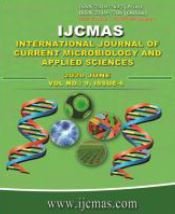


 National Academy of Agricultural Sciences (NAAS)
National Academy of Agricultural Sciences (NAAS)

|
PRINT ISSN : 2319-7692
Online ISSN : 2319-7706 Issues : 12 per year Publisher : Excellent Publishers Email : editorijcmas@gmail.com / submit@ijcmas.com Editor-in-chief: Dr.M.Prakash Index Copernicus ICV 2018: 95.39 NAAS RATING 2020: 5.38 |
Amelioration of salt-affected soils requires an integrated management approach, which not only improves their effectiveness for improving soil properties, but also increases the crop performance and stress tolerance ability of the crop. Hence, a green house experiment was conducted to determine the effect of integrated use of crop residue and inorganic source of fertilizers with exogenous foliar sprays on soil microbial population and DEH enzyme activity of maize grown saline soil (ECe 6.2 dS m-1). Treatments included: 100 % RDFN (Recommended dose of nitrogen fertilizers) (T1); 25 % extra nitrogen through inorganic fertilizers (T2); 25% extra N through raw residue (T3); 25% extra N through compost (T4); and combination of T2, T3 and T4 treatments with exogenous foliar sprays humic acid / proline / KNO3 in a CRD layout. Result obtained at various stages of crop growth indicated a steady increase in bacterial, fungi, actinomycetes count and dehydrogenase enzyme activty startng from inital stage with more pronounced influence on fungal colonies as ther are more senstive to abotic stress with integrated application of crop residue and exogenous spray. Highest population of 21.33 × 105, 13.00 × 103, 20.67 × 104 bacteria, fungi, actinomycetes, respectively and the highest dehydrogenase activity of 36.67 µg g-1 of TPF g-1 day-1 was observed in compost amended treatment (T13) along with KNO3 foliar spray at tasseling.
 |
 |
 |
 |
 |